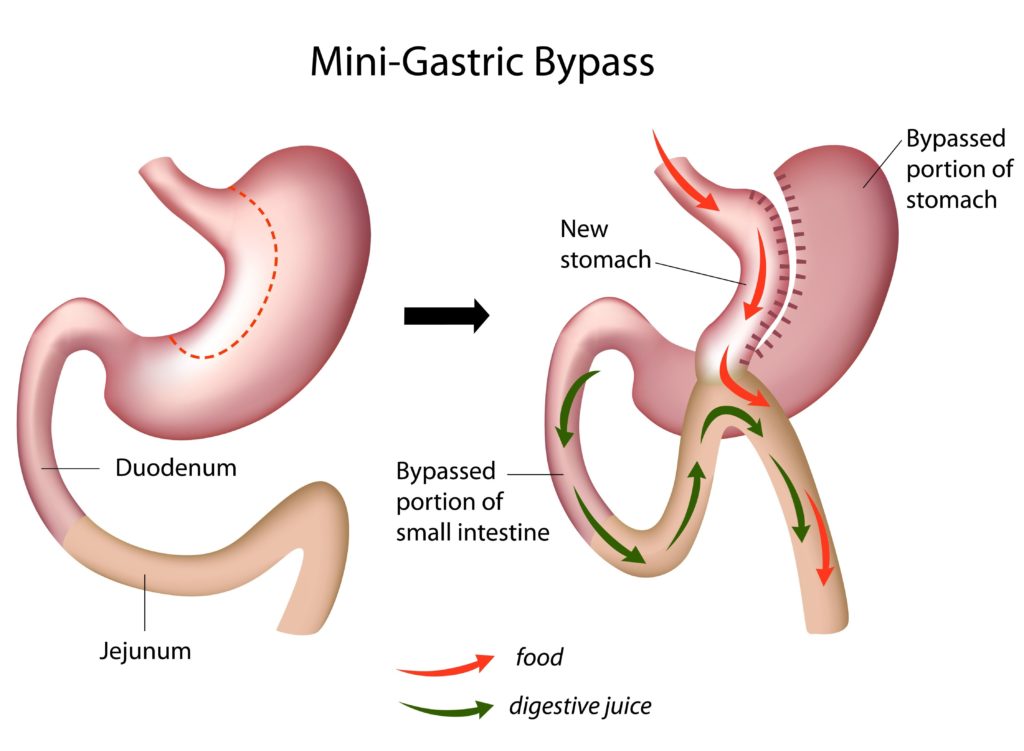What is a Mini Gastric Bypass: The obesity and overweight become reached epidemic proportions in the last decades. The World Health Organization (WHO) pointing out that nearly 2 billion people are at least overweight worldwide. In recent years, a surgical procedure perceived as the single-anastomosis gastric bypass or mini-gastric bypass surgery has been developed.
The mini-gastric bypass surgery frequency has increased considerably in the current decade.

Initially defined by Rutledge, this method offers a simplification of Roux-en-Y bypass by doing a single anastomosis, with a notable reduction of technical complexity, less operative time and a potential decrease in morbidity and mortality. Numerous studies have confirmed the benefits provided by this mini-gastric bypass surgery. this method comprises excess weight loss and resolution of comorbidities equivalent or also higher than those observed following the Roux-en-Y gastric bypass.
Mini Gastric Bypass Procedure
The mini gastric bypass is an effective and well-established method which consolidates some of the properties of a gastric sleeve and a conventional gastric bypass. The top part of the stomach is separated into a tube, comparable to the top three-quarters of a sleeve, and later attached to a loop of intestine.
The mini-gastric bypass package is used as a primary weight loss method. It can likewise be used in patients who become had previous gastric sleeve surgery but have been frustrated with weight loss, or who become had band-related complications and possess decided on gastric bypass revision.
The Mini-Gastric Bypass is not ideally befitted to patients with symptoms of reflux disease (severe heartburn that requires medication).
In this procedure, the upper part of the stomach is stapled to make a thin tube (30ml to 50ml in size). The thin tube shifts the new, shorter stomach and is entirely separate from the rest of the stomach. This stomach is then tacked to a loop of the small intestine, bypassing the duodenum and almost 150–200cm of the bowel. The rest of the stomach and upper part of the small intestine resides in the body although those parts are no longer used for food digestion.
Required BMI for Mini-Gastric Bypass
Starting with 35kg/m2
Expected weight loss from Mini-Gastric Bypass
70-80% of excess body weight
Surgery time for Mini-Gastric Bypass
1 hour
Hospital stay for Mini-Gastric Bypass
3 nights
Sick Leave for Mini-Gastric Bypass
2-3 weeks
Need for supplements for Mini-Gastric Bypass
Life-long need
Mini Gastric Bypass Benefits
By diminishing the feeling of hunger throughout the altered gut to brain signalling.
By permitting an earlier feeling of satiety and fullness during eating a meal resulting in healthy portion size.
By reducing the number of calories you absorb from your food as a consequence of bypassing 150 to 200cm of the upper part of the small intestine.
Several studies of mini gastric bypass have shown that two years following the surgery, weight loss is 75-85% of excess body mass; five years following the surgery, the excess body mass loss is 70-75%.
Many diseases related to being overweight like type 2 diabetes, sleep apnoea, high blood pressure, joint diseases or polycystic ovary syndrome (PCOS) improve better or disappear as a result of the surgery.
Long-term effects of any gastric surgery that are reliant on lifestyle, particularly in relation to diet and exercise.
Mini-Gastric Bypass Complications
As with any surgical method, the mini-gastric bypass operation has a risk of complication which is necessary to understand before the operation. Maximum of the following complications are very rare and 90–95% of patients become no issues.
Mini-Gastric Bypass Possible Early Complications
The most likely early complication has been postoperative bleeding (1% of patients).
Other early complications occurrence 0.5% may be peritonitis; myocardial infarction; pneumonia; thrombus of deep veins and lung artery; abdominal abscess; wound infections; hernias at the surgical site, ulcers.
90% of complications that require additional special therapeutic care occur within 48 hours following surgery, when the patient is still in the hospital.
Mini-Gastric Bypass Possible Late Complications & Side Effects
An internal hernia – Hazard of an internal hernia is considerably lower after mini-bypass (1:500) than following standard gastric bypass (2:100).
Any procedure in the stomach can cause adhesions (scar tissue). This can happen any time later the operation and can sometimes create problems with the bowel getting stuck or twisted. This may necessitate hospitalization and may also require re-operation.
If reflux happens post-operatively some patients may need acid-suppressing medication. This operation should be withdrawn for those people with severe manifestations of reflux prior to surgery.
Dumping syndrome that usually happens due to poor food choices. It is the consequence of high sugar foods passing too quickly into the small intestine. Symptoms can involve nausea, dizziness, cramping, weakness, and fatigue. Dietary guidance to withdraw dumping is provided by the clinic’s dietician.
Low levels of iron, B12 vitamin, and different micronutrients can transpire even if recommendations for supplementation are supported. For this cause, regular follow-up visits and blood tests once a year are strongly advised to avoid the risk of malnutrition.
Mini Gastric Bypass Cost
The mini gastric bypass method typically costs fewer than Roux-en-Y surgery. On an average, if patients qualify for the mini gastric bypass surgery, a typically mini gastric bypass cost between $14,000 and $22,000.
LAP-BAND Surgery Cost within $15,000 and $30,000 for their lap band surgery and also postoperative care.
Gastric Sleeve Cost in the United States nearly$23,000.
Gastric band cost in the United States nearly $14,500.
Sleeve gastrectomy cost is $14,900.
Duodenal Switch Surgery Costs nearly $27,000 in the United States.
Although this cost varies widely across states and clinics. This surgery is likewise done by some surgeons in Mexico at a lower cost than in the United States. So before weight loss operation, spend time settling if your insurance will meet your weight loss surgery.

